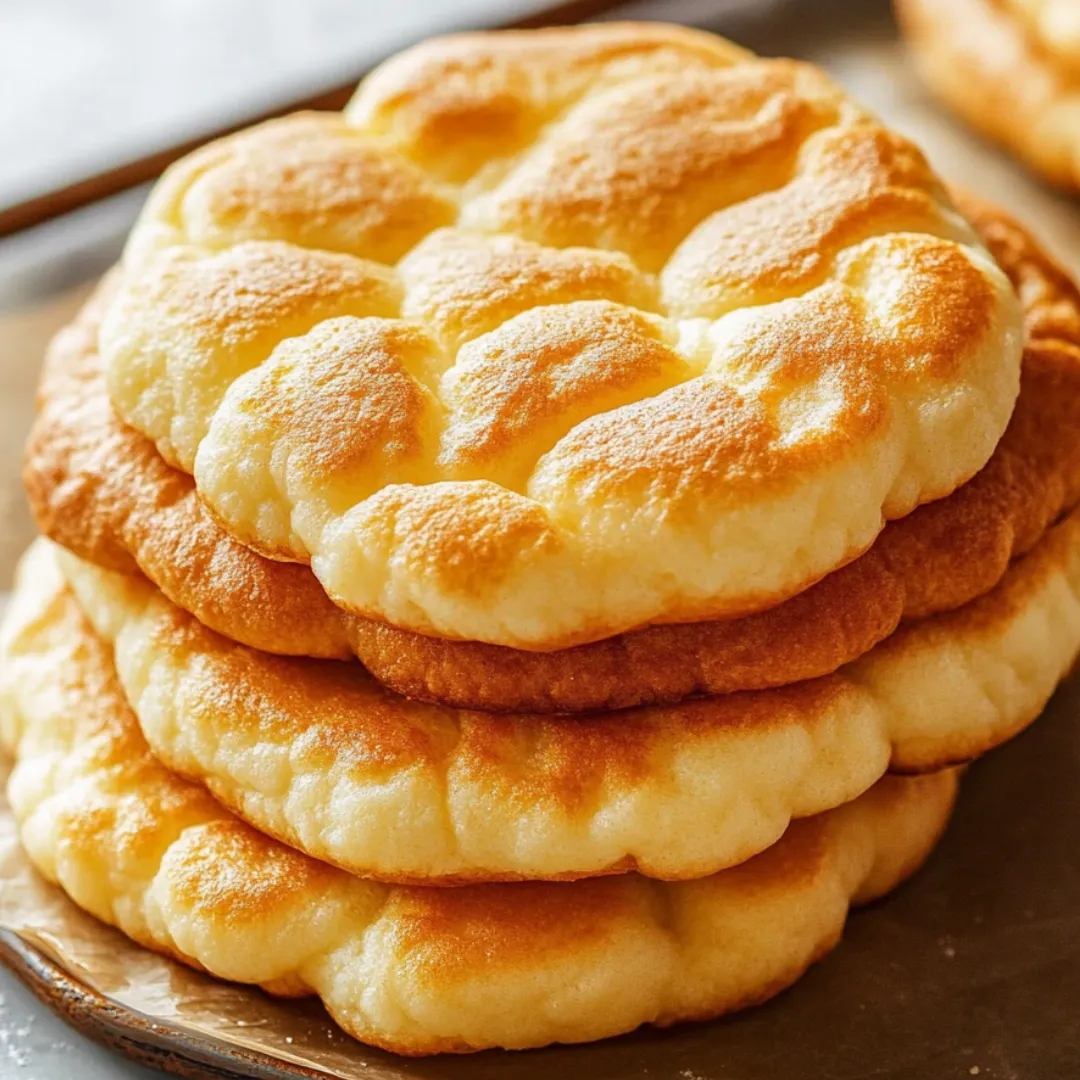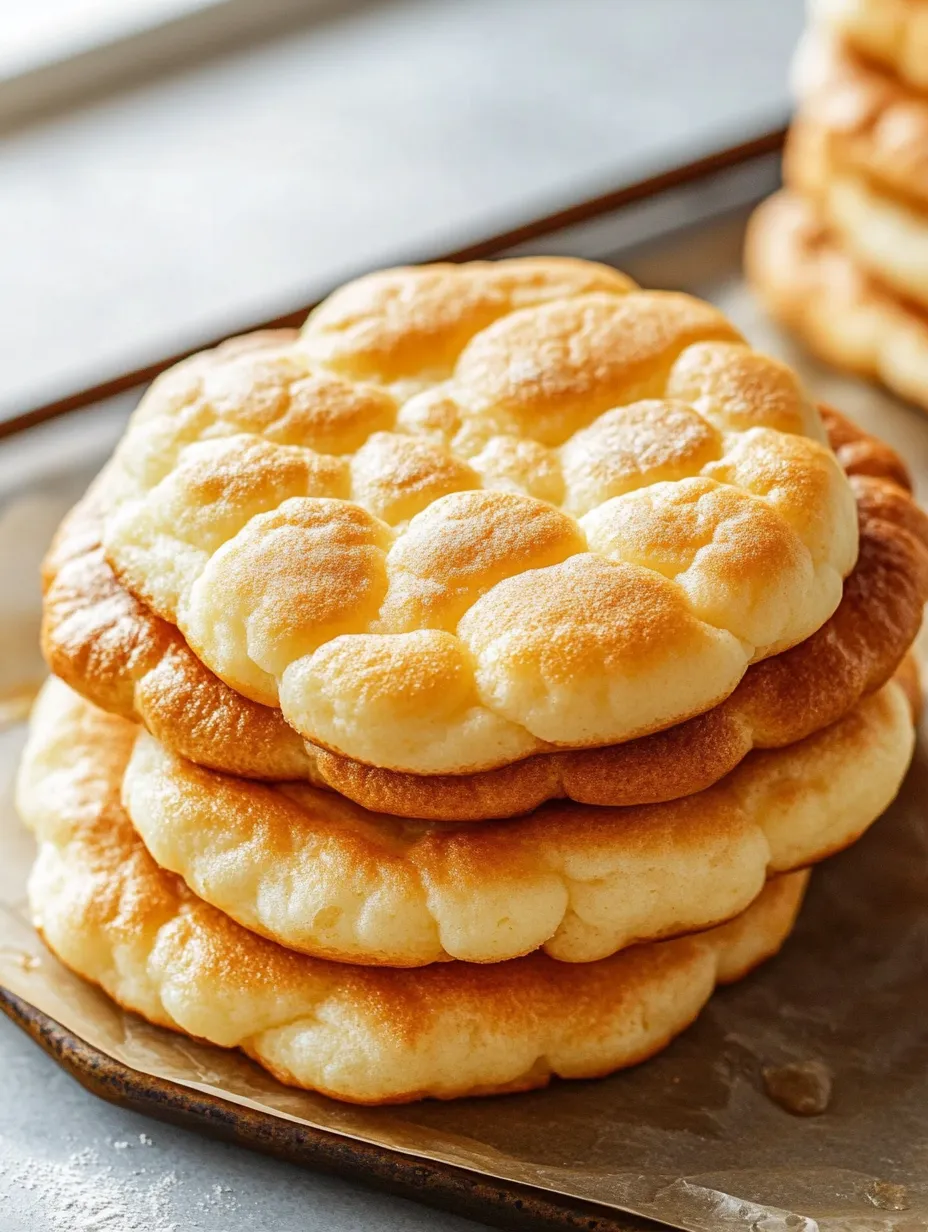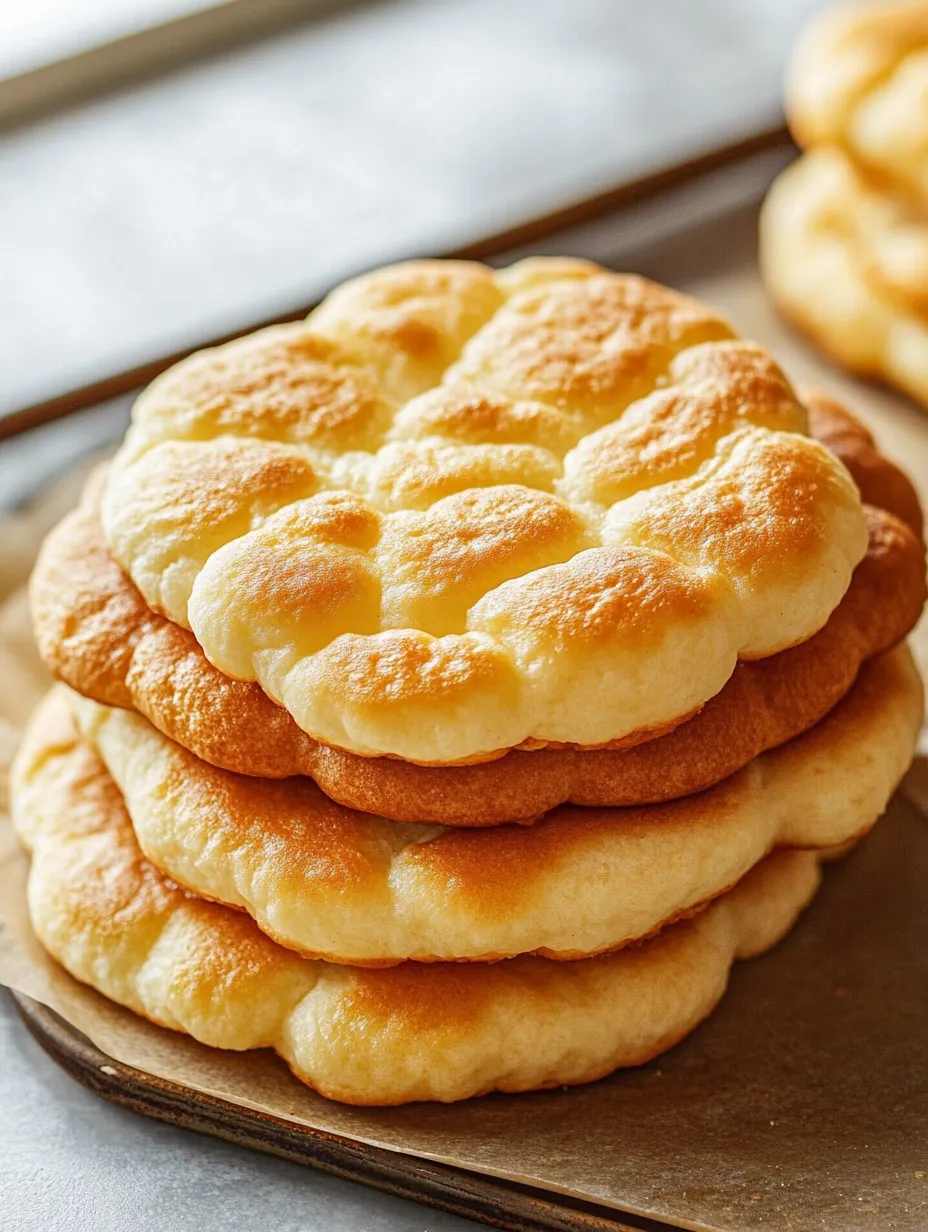 Pin it
Pin it
This magical Flourless Cloud Bread defies traditional baking expectations by creating pillowy, airy rounds without a speck of flour in sight. The secret lies in perfectly whipped egg whites that create a structure so light it seems to float on your plate. With a delicate, slightly cheesy flavor and a texture reminiscent of the lightest soufflé, these versatile bread rounds can transform from savory to sweet with just a few simple additions. Whether you're following a gluten-free diet or simply curious about this internet sensation, these cloud-like creations will bring a touch of culinary wonder to your table.
I first attempted making cloud bread after seeing it trend across social media platforms, skeptical that something without flour could truly resemble bread. To my surprise, the texture was even better than I'd hoped—airy, light, and with none of the eggy flavor I'd feared. My family was equally impressed, especially my gluten-sensitive daughter who immediately asked if she could use them for her morning avocado toast. What I appreciate most is the chameleon-like quality of these rounds; one batch can satisfy both my husband's preference for savory garlic-cheese flavors and my children's desire for a cinnamon-sugar treat.
Ingredients You'll Need
- 3 Eggs, separated: The foundation of this recipe, providing structure and volume. Room temperature eggs separate more easily and whip to greater volume
- 3 tablespoons (45g) Cream Cheese, softened: Adds richness and a subtle tanginess that counterbalances the egg. Full-fat works best for flavor and texture
- 1 tablespoon (15g) Sugar: Stabilizes the egg whites while adding just a hint of sweetness. Can be replaced with a sugar substitute if preferred
- ¼ teaspoon Cream of Tartar: This crucial ingredient helps stabilize the egg whites and maintain their volume during baking. If unavailable, substitute with a few drops of lemon juice or white vinegar
 Pin it
Pin it
Step-by-Step Cooking Instructions
- Prepare Your Workspace:
- Begin by preheating your oven to a moderate 300°F (150°C). Line a baking sheet with parchment paper—not wax paper or foil, as the delicate mixture may stick to these alternatives. Ensure your mixing bowls are completely clean and free from any grease, which can prevent egg whites from whipping properly. Separate your eggs carefully, ensuring no yolk contaminates the whites, and allow them to come to room temperature for optimal volume.
- Create a Stable Meringue:
- In a large, clean bowl, combine the egg whites and cream of tartar. Using an electric hand mixer or stand mixer with whisk attachment, begin beating on medium speed until the mixture becomes foamy and opaque. This initial stage usually takes about 1-2 minutes. The cream of tartar is crucial here as it stabilizes the egg proteins, allowing them to trap more air.
- Develop Perfect Peaks:
- Once your egg whites are foamy, gradually add the sugar—about a teaspoon at a time—while continuing to beat. Increasing to medium-high speed, continue whipping until truly stiff peaks form. This is the most critical step of the recipe. The meringue should be glossy and firm enough that when you lift the beaters, the peaks stand straight up without folding over. If you were to turn the bowl upside down (though I don't recommend testing this!), the mixture should not slide out. This process typically takes 3-4 minutes of continuous beating.
- Prepare the Yolk Mixture:
- In a separate bowl, combine the egg yolks and softened cream cheese. Using the same beaters (no need to clean them first), beat until the mixture is smooth and no cream cheese lumps remain. The mixture should be a uniform pale yellow color. This should take about 1-2 minutes. The softened cream cheese is essential here—if it's too cold, it won't incorporate properly.
- Combine with Care:
- This step requires a gentle touch to maintain the air trapped in your meringue. Using a rubber spatula, carefully fold the yolk mixture into the egg white meringue. Use a down-across-up-and-over motion, turning the bowl slightly after each fold. Continue until just combined and no streaks remain visible. The mixture should remain voluminous and light—overmixing will deflate the air bubbles you've worked so hard to create.
- Form Your Cloud Breads:
- Using a large ice cream scoop or 1/3 cup measuring cup, gently portion the mixture onto your prepared baking sheet. Aim for 6-8 evenly sized mounds, leaving at least 2 inches between each as they will spread slightly during baking. With the back of a spoon, carefully shape them into uniform circles about 3/4 inch thick. For the most professional appearance, smooth the tops slightly but don't press down firmly as this will remove air.
- Bake to Perfection:
- Place the baking sheet in the preheated oven and bake for 25-30 minutes, or until the tops become golden brown and the centers are set. Avoid opening the oven door during the first 20 minutes of baking, as the temperature drop can cause your clouds to collapse. The bread rounds should feel firm to the touch and be slightly crisp on the outside while remaining soft inside.
- Cool Properly:
- Allow the cloud bread to cool on the baking sheet for about 3 minutes, then transfer to a wire rack to cool completely. During this cooling period, they will firm up slightly while maintaining their soft interior. If you plan to store them, ensure they're completely cool before placing in containers to prevent condensation and sogginess.
I learned the importance of proper egg white whipping the hard way during my first attempt at this recipe. I thought I had reached stiff peaks, but in reality, they were still at the soft peak stage. The result was a flatter, less impressive cloud bread that spread too much during baking. Now I make sure to whip until the meringue is so firm it almost feels like marshmallow fluff, and the difference is remarkable. My favorite way to enjoy these is fresh from the oven with a light brushing of garlic butter and a sprinkle of parmesan—the contrast between the crisp exterior and soft interior creates an almost croissant-like experience that's impossible to resist.
Flavorful Variations
The beauty of cloud bread lies in its versatility as a blank canvas for various flavors. For a savory version, fold in 2 tablespoons of finely grated parmesan, a teaspoon of dried herbs, or a clove of minced garlic along with the egg yolk mixture. For an Italian-inspired version, sprinkle the tops with dried oregano and a light dusting of garlic powder before baking. If you prefer sweet applications, try adding a quarter teaspoon of vanilla extract to the yolk mixture, then dusting the finished breads with cinnamon sugar while still warm from the oven.
Perfect Pairings
Cloud bread makes an excellent accompaniment to both meals and snacks. Use them as an impressive base for benedicts at brunch, split and toasted with a touch of butter. For lunch, they can replace traditional bread for light sandwiches—particularly good with smoked salmon and cream cheese or avocado and tomato. They shine as an afternoon snack when topped with a spread of ricotta and a drizzle of honey. Their neutral flavor profile complements soups beautifully, allowing them to serve as a gluten-free alternative to dinner rolls.
Troubleshooting Tips
If your cloud bread deflates significantly during or after baking, your egg whites likely weren't stiff enough. Temperature fluctuations can also cause deflation, so try to maintain a constant oven temperature. If your bread spreads too much during baking, the batter may have been overmixed, breaking down the air bubbles. Remember that folding should be done gently and minimally—just enough to incorporate the ingredients without deflating the mixture.
Make-Ahead Options
While cloud bread is best enjoyed fresh from the oven, you can prepare them in advance. Store completely cooled breads in a single layer in an airtight container with parchment paper between layers if you need to stack them. They'll keep at room temperature for up to three days. For longer storage, freeze in a ziplock bag with parchment between each piece. Frozen cloud bread can be refreshed in a 300°F oven for 5 minutes or toasted lightly before serving.
 Pin it
Pin it
Health Benefits
Beyond being naturally gluten-free, cloud bread is also low in carbohydrates and higher in protein than traditional bread, making it suitable for various dietary approaches including keto and low-carb. Each piece contains approximately 40 calories, primarily from protein and fat. The eggs provide high-quality protein and important nutrients like choline, which supports brain health, while the minimal ingredient list makes it an excellent option for those avoiding preservatives and additives found in commercial breads.
What started as a simple experiment with a trending recipe has become a regular feature in my kitchen. The transformation of such basic ingredients—eggs, cream cheese, and a touch of sugar—into something that mimics bread without any flour still feels like a bit of kitchen magic every time I make it. The expression on guests' faces when I explain there's no flour involved is always priceless. Beyond the novelty factor, I've come to appreciate cloud bread as a legitimate cooking technique that offers a delicious alternative for those who avoid traditional bread. Whether you're following a special diet or simply enjoy culinary experiments, these pillowy rounds deliver both satisfaction and versatility while proving that sometimes the simplest recipes can be the most impressive.
Frequently Asked Questions
- → Why did my cloud bread collapse?
- Cloud bread collapses when the egg whites are not beaten to stiff enough peaks or when the mixtures are overmixed. Be sure to beat egg whites until they form very firm peaks that don't droop, and fold the mixtures together gently to maintain as much air as possible.
- → Is cloud bread actually bread?
- Cloud bread isn't traditional bread as it contains no flour or yeast. It's a low-carb, gluten-free alternative made primarily from eggs that has a light, airy texture somewhat similar to very soft bread or thick crepes.
- → Can I make cloud bread ahead of time?
- Yes, cloud bread can be made ahead and stored in an airtight container or ziplock bag for up to 3 days at room temperature, or frozen for up to a month. It's best to place parchment paper between pieces to prevent sticking.
- → What does cloud bread taste like?
- Cloud bread has a mild, slightly eggy flavor with a hint of sweetness. The taste is neutral enough that it works well with both sweet and savory toppings, and it can take on different flavors with the addition of herbs, spices, or cheese.
- → Can I use something instead of cream of tartar?
- You can substitute the cream of tartar with 1/2 teaspoon of lemon juice or white vinegar. These acidic ingredients help stabilize the egg whites in a similar way, though cream of tartar provides the most reliable results.
